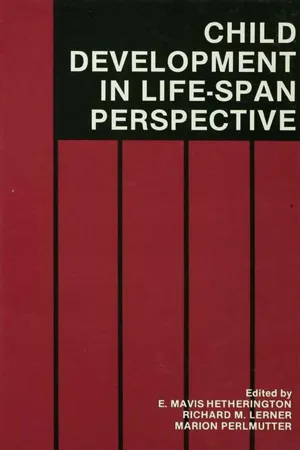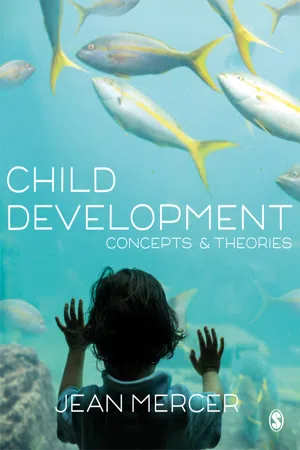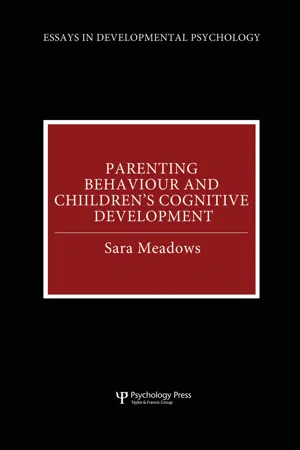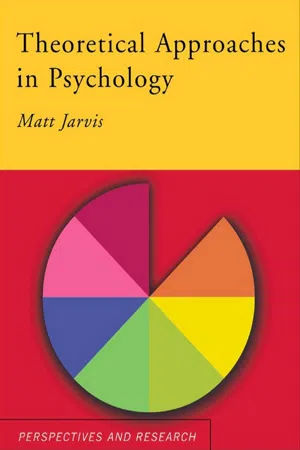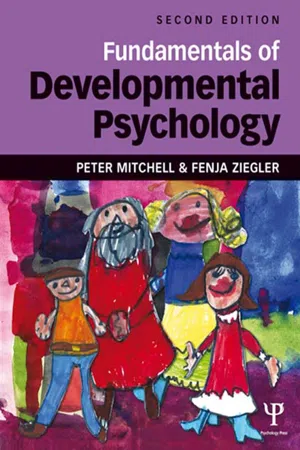Psychology
Cognition and Development
Cognition and development refer to the mental processes and growth that occur as individuals acquire knowledge, solve problems, and understand their environment. This area of study explores how cognitive abilities, such as attention, memory, language, and reasoning, evolve from infancy through adulthood. It also investigates the impact of social, cultural, and environmental factors on cognitive development.
Written by Perlego with AI-assistance
8 Key excerpts on "Cognition and Development"
Learn about this page
Index pages curate the most relevant extracts from our library of academic textbooks. They’ve been created using an in-house natural language model (NLM), each adding context and meaning to key research topics.
- eBook - ePub
Developmental and Educational Psychology for Teachers
An applied approach
- Dennis McInerney, David Putwain(Authors)
- 2016(Publication Date)
- Routledge(Publisher)
5 Cognition and cognitive development: infancy to late childhoodIntroductionIn the last two chapters we have considered the physical growth of children from early childhood through to early adulthood. We noted that cranial growth during the early childhood years is very significant and by the age of five years has achieved 75% of its adult size. The development of the brain is directly related to the development of motor coordination and a number of other developmental trajectories. Accompanying this cranial growth is also the development of cognition. Cognitive development is the development over time of the ability to think and reason and to understand the world in which we live. A knowledge of cognitive development is essential for teachers and educators. Does a child think in the same way as an adult? How does a child process information? When can we expect a child to perform particular mental processes? What is intelligence? What is creativity? Can we measure these? What influences cognitive development? These, and many other questions, are of central importance to educators.What is cognition? Broadly, cognition refers to the intellectual activity of an individual, i.e. the mental processes; involving all aspects of thought and perception. As with the development of the physical structures of the body, the major cognitive processes that are inherent in being human, mature in an orderly way in children provided the environment contains the normal experiences of childhood such as social interaction, environmental stimulation, and good diet. In other words, a child in any normal environment will develop a full range of cognitive capacities. However, limited environments (that is those restricting the experiences a child has access to, such as poorly run institutional homes, severely abusing and neglectful homes, or severe malnourishment) may impede normal cognitive development. - eBook - ePub
Forensic Psychiatry
Fundamentals and Clinical Practice
- Basant Puri, Ian H. Treasaden, Basant Puri, Ian H. Treasaden(Authors)
- 2017(Publication Date)
- CRC Press(Publisher)
8Developmental psychology
NATHALIA L. GJERSOE AND CATRIONA HAVARD Introduction Cognitive development Personality Social development Sexual development The child as witness Conclusion ReferencesINTRODUCTION
Developmental psychology is a discipline that encapsulates the full spectrum of psychological processes throughout the life span. Theories developed as part of this research have important implications not just for our understanding of children’s behavior and growth but also for how we conceptualize the human mind as a whole. Often there are processes so inextricably interwoven and sophisticated in adults that understanding them requires examination from their inception in the developing brain. This chapter focuses on the age range between infancy and late childhood and summarizes theories of children’s cognitive, personality, social, and sexual development, concluding with an outline of current opinion regarding children’s capacities as eyewitnesses.COGNITIVE DEVELOPMENT
Even newborns come into the world with a toolkit of basic sensory capacities and biases to attend to specific types of information. This stream of information forms the basis for mental representations—patterns of neuronal activity that refer to aspects of the external world. Developmental cognitive psychology examines mechanisms of change in mental representations throughout the life span. Examining cognitive development in infants and young children requires its own set of methodologies distinct from those used to examine adults. Children have limited communication and -comprehension abilities, disorganized or slow motor responses, and are easily distracted. Traditionally, research into cognitive development utilized naturalistic observation of children’s behavior at different ages and manipulated situations to determine if children’s responses changed in a reliable manner from age to age. This work has revealed a host of cognitive capabilities that all typically developing children seem to attain within a very similar time period—referred to as cognitive milestones - eBook - ePub
- E. Mavis Hetherington, Richard M. Lerner, Marion Perlmutter, E. Mavis Hetherington, Richard M. Lerner, Marion Perlmutter(Authors)
- 2013(Publication Date)
- Psychology Press(Publisher)
9 COGNITIVE DEVELOPMENT IN LIFE-SPAN PERSPECTIVE: From Description of Differences to Explanation of Changes Marion Perlmutter University of Michigan ABSTRACT The purposes of this chapter are to articulate an agenda for cognitive developmentalists and to consider how well it is being met. It is suggested that cognitive developmentalists should be addressing two major questions: What are the ways that cognition changes with age? and What are the causes of this change? An overview of alternative approaches to the study of cognitive development is presented, and an integrative, three tier model, framed within a multidisciplinary perspective is forwarded. It is argued that research on cognitive development has made considerable progress with respect to describing the ways that cognition changes with age but has failed in explaining the causes of age change. Some conceptual reasons for the paucity of such information are discussed, and recommendations are made for the reconceptualization of research design, adoption of a life span perspective, and reassessment of assumptions. INTRODUCTION Cognition is a psychological construct that refers to all of mental life. It includes perception, memory, intelligence, reasoning, judgment, and decision making. It permits humans to represent and to think about the world, to conceptualize experience, to fantasize beyond experience, to maintain a sense of self, and to communicate with others. It expands individual competence and allows us to solve and to circumvent problems. Memory, for example, keeps track of events that have occurred in different times and distant places. Intellectual skills enable us to reflect upon experiences and to attach meaning and significance to them. As individuals, this ability gives us the power to anticipate and plan for the future, to develop strategies, to hypothesize alternatives, and to evaluate consequences - eBook - ePub
Child Development
Concepts and Theories
- Jean A. Mercer(Author)
- 2018(Publication Date)
- SAGE Publications Ltd(Publisher)
The range of topics included as aspects of cognition means that although general developmental concepts are applied to all cognitive functions, more specific concepts are needed for particular areas of development. Although biological foundations for cognition are suggested in the study of language and in Piaget’s theory of cognitive development, on the whole, cognitive development is seen as having a high degree of plasticity, with experience playing a strong role in the development of cognitive abilities. Behaviouristic views give great stress to the effect of learning from experience on cognition. Developmental trajectories involving either continuous or discontinuous, stage-like cognitive change are a subject of research on cognitive development and are related to normative measures used to ascertain whether a child’s cognitive progress is typical or atypical. Atypical development of cognitive abilities, including those of language and communication, can be approached with interventions intended to bring individual children’s development into the typical range. The chapter concludes with organizing questions about language development and with a list of learning objectives. - Sara Meadows(Author)
- 2013(Publication Date)
- Psychology Press(Publisher)
The big divide, I think, is between those models where development is largely asocial and predominantly endogenous, and those where it is socially constituted or exogenous. There is a basic philosophical divide here which places Hegel on one side and Kant on the other (see, e.g. Markova, 1982); or, in contemporary work, at one extreme we have nativist theories postulating innate ideas (e.g. Fischer & Bidell, 1991; Fodor, 1981, 1983; and see also Plomin, 1994b; Plomin & McClearn, 1993) and at the other we are essentially constituted by our society (e.g. Bronfennbrenner & Ceci, 1993; Mayall, 1994). Most developmental psychologists agree that "cognitive development" involves change from a starting point which includes some innate predispositions, if not ideas, towards later states which vary in their content and in their sources, and that this change comes about largely through an active engagement of the individual with the physical and social worlds; however, emphases within this general agreement differ considerably. The debate in the psychology of cognitive development is embodied in the work of Piaget and Vygotsky. Each acknowledged that cognitive development is both endogenous and influenced by the outside social world, and each admired the other's work even when there were disagreements, but they developed different emphases, particularly regarding the role of adult-child interaction in the development of the child's cognition (Glassman. 1994; Van der Veer & Valsiner, 1991). I will outline their theories in turn. Piagetian theory has been understood as marginalising the role of adults in children's cognitive development, and so might be judged to be irrelevant to this essay, but an understanding of this child-centred approach is essential for an appreciation of the strengths and the problems of theory which takes the alternative approach and centres on adults' contributions to children's cognition.- eBook - ePub
- Matt Jarvis(Author)
- 2005(Publication Date)
- Routledge(Publisher)
- Cognitive-developmental theory has been applied successfully in the field of education. Modern teaching techniques ranging from individual discovery learning to computer-aided work in pairs has been influenced by the work of Piaget and Vygotsky.
- There are other situations in which it is helpful to have a good understanding of the way in which children think. These range from play-work, in which it is helpful to understand children’s concepts of rules, to anaesthesiology (the study of pain and pain relief), where it is invaluable to have a grasp of children’s understanding of the pain they are experiencing as a result of medical conditions and medical procedures.
Despite these invaluable contributions, a cognitive-developmental approach is not generally considered to be sufficient for a complete understanding of psychology, or even of child psychology. Some of its limitations include the following:- From a psychodynamic perspective, the cognitivedevelopmental approach neglects the importance of children’s emotional development. In a sense this is not a fair criticism of Piaget, who admired the work of Freud (see Chapter 3 ) and saw his own work as complementing rather than rivalling Freud’s theories. However, it is fair to say that the cognitivedevelopmental approach does not really tackle emotional development, which is clearly of huge importance to children’s psychological development.
- From a behavioural perspective (see Chapter 2 ), the cognitivedevelopmental approach overemphasises speculation about mental processes at the expense of more scientific research into the importance of conditioning in learning.
Summary
Cognitive-developmental psychology is an approach to understanding the development of logical thought, and the ways in which this impacts on our behaviour. The most influential theory in this area comes from Piaget, whose major contribution was in identifying the ways in which childhood logic differs from that of adults. Piaget also emphasised the process by which children explore and learn from their environment. Vygotsky broadly agreed with many of Piaget’s ideas, but placed more emphasis on the importance of learning from others than learning by discovery. Both Piaget’s and Vygotsky’s ideas have been applied to teaching. The ideas of both Piaget and Vygotsky point towards an active role for pupils in their learning, but whereas followers of Piaget advocate solo discovery learning, educationalists influenced more by Vygotsky tend to prefer group work and more help by teachers and other learners. Computer-aided learning, a growth area in education, can be understood from the viewpoints of both Piaget and Vygotsky. - eBook - ePub
- Peter Mitchell, Fenja Ziegler(Authors)
- 2013(Publication Date)
- Psychology Press(Publisher)
3 DOI: 10.4324/9780203736357-3Contents
Introduction Stages of cognitive development Piaget’s explanation of cognitive development Traditional learning theory as a contrasting explanation of development A supplement to Piaget’s theory: Self-centered adolescents SummaryThe development of thinking 3
Chapter Aims- To introduce Piaget’s theory of cognitive development. To detail Piaget’s stages.
- To detail the evidence that lends support to Piaget’s stage theory.
- To present the mechanism that Piaget posited as responsible for cognitive development.
Introduction
The discipline concerned with studying the development of thinking is cognitive developmental psychology. The word “cognitive” refers to knowledge, but not necessarily according to the common meaning of the word. When people talk about knowledge, they usually mean the kind of information useful for answering questions in games such as The Weakest Link or Who Wants to be a Millionaire, or in order to do college exams. In contrast, cognitive developmentalists think of knowledge as referring to understanding about things.You might have noticed a child aged around 5 years speaking on the telephone about things only he can see: He seems to overlook the fact that the person he is speaking to is in a completely different location and cannot see the same things. Perhaps this is a sign that the young child is incapable of putting himself in someone else’s shoes. In the broadest sense, it is tempting to suppose that the child does not understand that other people can have different perspectives. Cognitive developmentalists look at particular difficulties children have, such as poor communication ability, and then draw general conclusions about their underdeveloped knowledge of the world. An exciting aspect of cognitive developmental psychology concerns the things children say and do in various situations, and then speculating about the meaning of these in terms of what the child does or does not know about the world. - eBook - ePub
Child and Adolescent Psychology for Social Work and Allied Professions
Applied Perspectives
- Gabriela Misca, Peter Unwin(Authors)
- 2018(Publication Date)
- Bloomsbury Academic(Publisher)
Social work holds to values of inclusivity and openness, and these values extend to a consideration at all times as to whether clients really understand what is happening in their lives and the assessments and plans social workers make around them. Formal settings such as reviews, case conferences and courts are intimidating for people not used to their protocols and familiarities, and involvement can often be tokenistic. The use of jargon, failure to address questions in terms that a client can understand and a failure to explain systems and time frames around decision-making can be very confusing. Where parents and carers have learning disabilities, these issues become particularly pertinent, and are perhaps one of the reasons why a disproportionate number of children whose parents have learning disabilities are in the care system (Tarleton et al., 2006).Cognitive ability is also a core consideration for social workers in respect of children in care, whose educational attainment and likelihood of attending higher education fall very significantly behind the achievements of other children. In 2008, only 14% of children in care achieved 5 A*–C grade GCSEs compared with the national average of 65% for all children, these figures linking directly with future employment possibilities (DCFS, 2009). This is not because of their cognitive potential, but the lack of opportunity for their cognitive abilities to flourish due to emotional upheavals in their lives, the changes of placements and, historically, the lack of attention paid by professional staff across a range of disciplines to the educational attainment of children in care. These issues of learning disabilities and children in care will be returned to throughout the chapter.Theoretical perspectives in understanding cognitive developmentCognitive development refers to the changes in how humans think and learn through their development from infancy to adulthood. It is important to clarify that the difference in cognitive development between infants and children and adults is not only quantitative – in the sense that children know less – but also qualitative as there are significant differences in how children think about and understand their experiences. Various theories and research have put forward ideas of how our cognitive abilities develop over the lifespan, particularly from infancy/childhood through to adulthood, where the most important leaps occur in cognitive development. In this section we will focus on two influential perspectives: Piaget’s (1964) theory of cognitive development and Vygotsky’s (1978) socio-cultural theory, highlighting their strengths, limitations and applications in contributing to our understanding of cognitive development.


